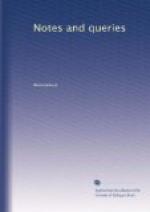Can any of your readers inform me what is the Armenian word for apricot, and whether there is any reason to believe that the Arabic words for apricot and peach, are of Armenian and Persian origin? If it is so, the resemblance of the one to praecox, and of the other to persicum, will be a curious coincidence, but hardly more curious than the resemblance of [Greek: pascha] with [Greek: pascho] which led some of the earlier fathers, who were not Hebraists, to derive [Greek: pascha] from [Greek: pascho].
E.C.H.
* * * * *
MINOR NOTES.
Chaucer’s Monument.—It may interest those of your readers who are busying themselves in the praiseworthy endeavour to procure the means of repairing Chaucer’s Monument, especially Mr. Payne Collier, who has furnished, in the November Number of the Gentleman’s Magazine (p. 486.), so curious an allusion from Warner’s Albion’s England, to
“—— venerable
Chaucer, lost
Had not kind Brigham reared him cost,”
to know that there is evidence in Smith’s Life of Nollekens, vol. i. p. 79., that remains of the painted figure of Chaucer were to be seen in Nolleken’s times. Smith reports a conversation between the artist and Catlin, so many years the principal verger of the abbey, in which Catlin inquires,
“Did you ever notice
the remaining colours of the curious little figure
which was painted on the tomb
of Chaucer?”
M.N.S.
[We have heard one of the lay vicars of Westminster {421} Abbey, now deceased, say, that when he was a choir boy, some sixty-five or seventy years since, the figure of Chaucer might be made out by rubbing a wet finger over it.]
Robert Herrick (Vol. i., p. 291.)—There is a little volume entitled Selections from the Hesperides and Works of the Rev. Robert Herrick. (Antient) Vicar of Dean-Prior, Devon. By the late Charles Short, Esq., F.R.S. and F.S.A., published by Murray in 1839. I believe it was recalled or suppressed, and that copies are rare.
J.W.H.
Epitaph of a Wine Merchant.—The following is very beautiful, and well deserves a Note. It is copied from an inscription in All Saints Church, Cambridge.
“In Obitum Mri. Johannis Hammond
Oenopolae Epitaphium.
Spiritus ascendit generosi Nectaris astra,
Juxta Altare Calix hic jacet
ecce sacrum,
Corporum [Greek: anastasei] cum fit
Communia magna
Unio tunc fuerit Nectaris
et Calicis.”
J.W.H.




